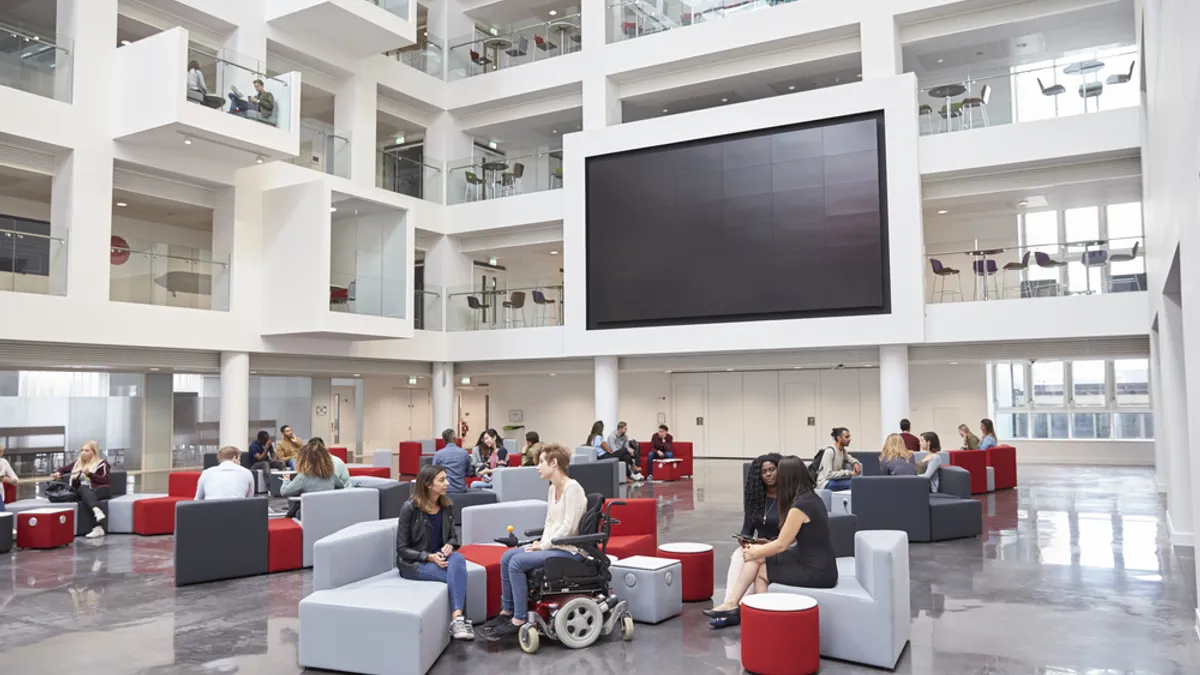Key Takeaways:
- Columbia and Cornell College report space management technology brings organization and simplicity to reserving shared spaces and resources by providing a single source of truth.
- Using new technology to manage shared spaces gives administration and facilities/events managers more control and visibility over their resources, reducing confusion and frustration.
- Improved space management frees students, faculty and staff to focus on why they’re there: to educate, learn and run an efficient institution—effortlessly.
Hybrid work is the norm in higher education, like most of the world’s institutions today. A 2021 EAB survey found the hybrid workforce within colleges was about 23%—a significant increase from just 6% prior to the pandemic—with no signs of stopping.
With a more distributed workforce—challenged with managing complex calendars and space reservations—building an organized and connected campus community requires intentionality and time. Having both remote and often physically separated workers makes it even more frustrating to efficiently streamline collaboration and communication.
University administration and events/facilities managers looking to simplify how students, faculty and staff reserve spaces and resources are scrapping the spreadsheets for easier to use (and much easier to oversee) space management technology.
Bring order to chaos with a single source of truth for space reservations
“Having one single place to check who is reserving what helps give us full visibility and control into what's going on in the building,” said Gavin Curless, Events/Facilities at Cornell College. “What’s more, someone who’s never seen the tool can figure it out. Students love seeing the interactive floorplan and space descriptions so they can book the right-sized space with the right resources when they need it.”
A single source of truth helps bring order to what can be a reservation nightmare of multiple spreadsheets, paper reservation systems and makeshift calendar bookings.
Whether it’s classrooms, labs, or meeting rooms, everyone can see in real-time what spaces and resources are available to them, bringing clarity to their decision making and also providing privacy for spaces that may be off limits.
Reduce confusion and increase visibility with automated controls
“Space management tech has restored order to the building,” said Curless. “Even on our busiest days, the Commons have a peace to it. It was Homecoming with a million things happening, and not once did I have to worry about someone being in the wrong room at the wrong time. Now we think: why would we do it any other way?”
Space management technology keeps track of occupancy and detailed reservation information, helping to reduce confusion and minimize disputes. If disagreements over spaces or other incidents occur, there is a history of reservations that can be referred back to.
Automated rules and reservation quotas also give university administration and events/facilities managers more control over their spaces by allowing them to decide how and when people can reserve spaces based on specific factors, such as access to buildings or activity-based needs. For example, universities can restrict space access to only students for residential buildings or require approval for premier spaces.
A simpler way to share space and resources increases satisfaction
“Our conference room and private office space is limited, so we want to make sure people get the room they need when they need it, without stepping on each other’s toes,” said Alejandro Vazquez, Administrative Manager at Columbia. “The tech just works. I don’t need to handhold anyone through the process. It’s one less thing we have to deal with so I can focus on more important things.”
Instead of having to sift through spreadsheets or checking for availability in person, space management technology allows people to see what a space looks like and easily check reservations in real-time, preventing confusion, double-booking, or lost reservations—and the frustrations that come with it.
The technology also brings equity to allocating spaces that helps improve the campus experience. Being able to schedule spaces and resources in advance, easily make changes when necessary and putting restrictions in place to prevent repeat reservations are all essential to ensuring everyone has access to what they need when they need it.
By leveraging technology to take care of administrative tasks associated with making space reservations, faculty, students and staff are freed up to focus on why they are there: to educate, learn and run an efficient institution—effortlessly.










